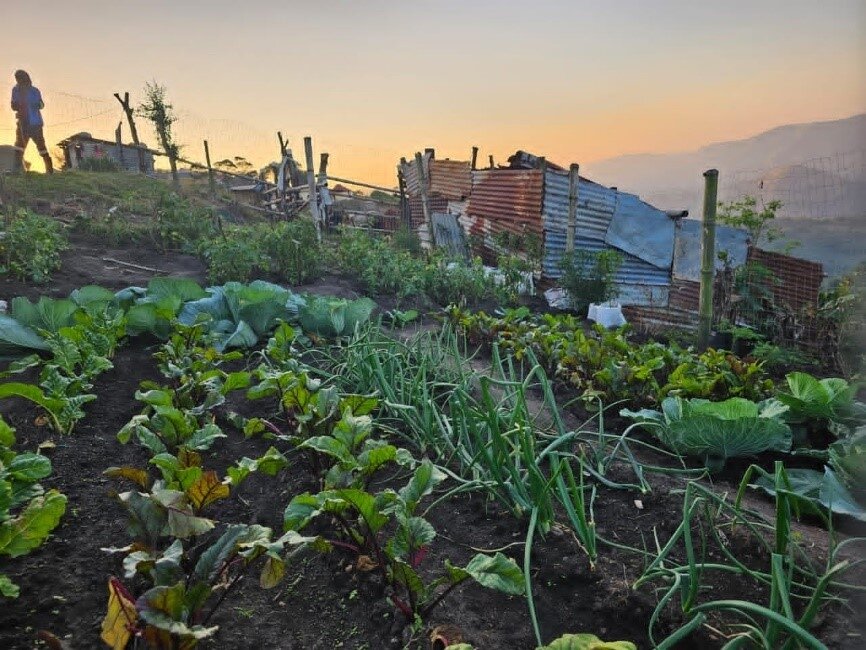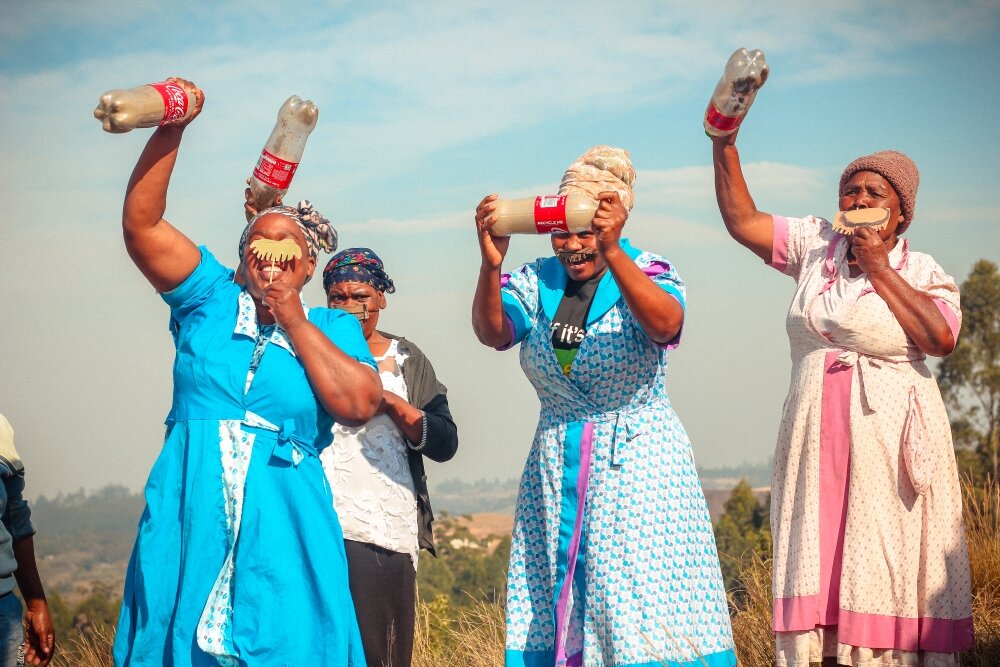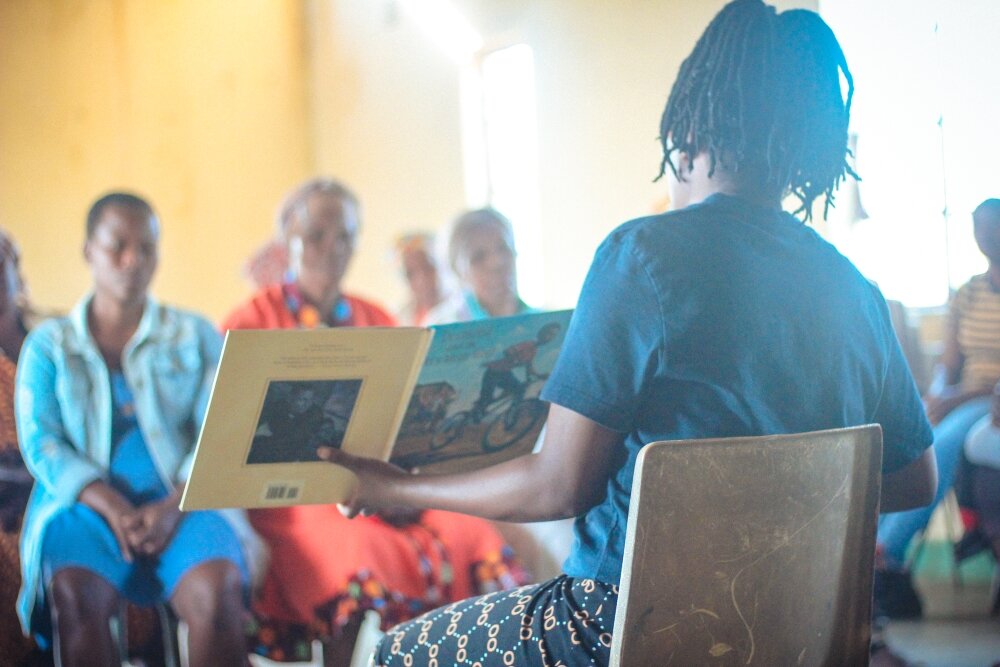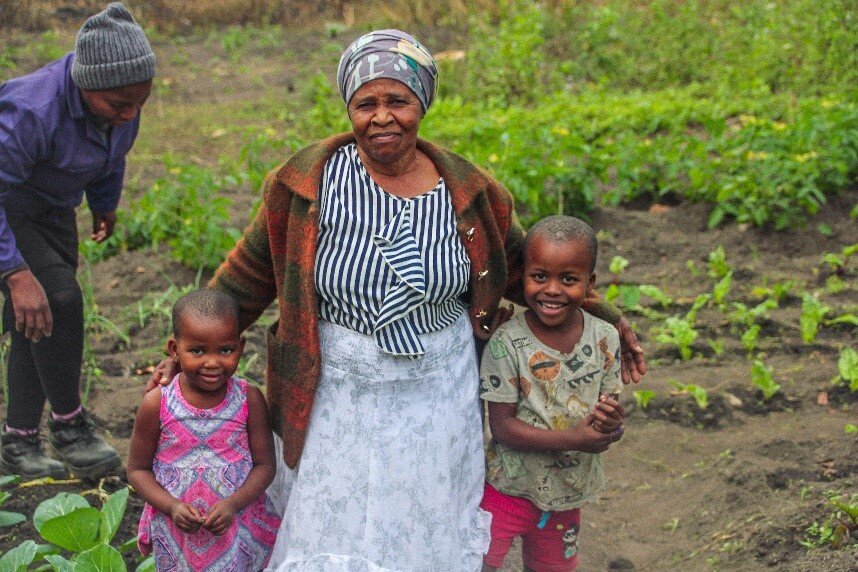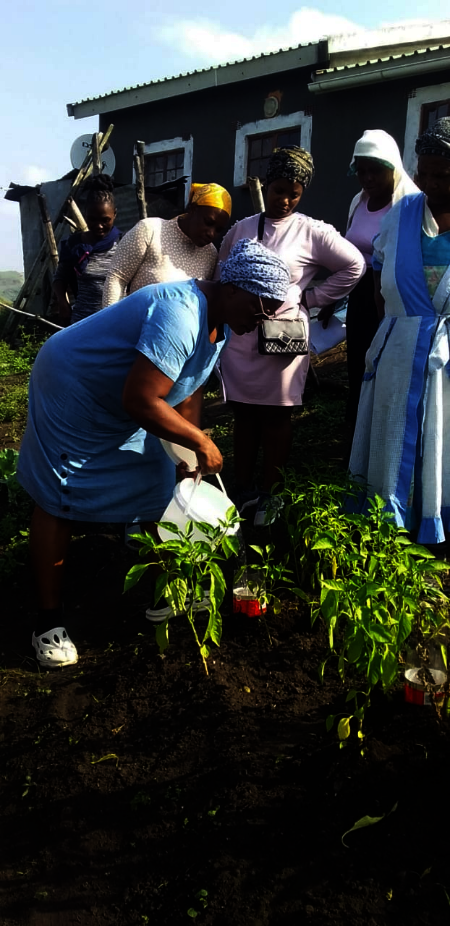By Candice McGregor | Reports and Communications Manager
Since Thanda’s inception in 2008, we have focused on building resilient individuals, then in 2020 the global pandemic caused us to cast our attention on the importance of building resilient households, to support the development of the individuals within them. In 2023 it became clear, that our impact is intensified across the board when support is offered to help build resilient neighbourhoods because when the entire neighbourhood puts their weight behind empowering the individuals within it, the groundswell of thinking and learning in a more progressive way gains even more momentum.
We rolled out a pilot in 2023 which involved hosting group meet-ups for the guardian participants of Thanda’s Baby and Home Visiting Programmes and it was received very well. Guardians advised that the energy within the neighbourhood felt as though it was changing, with the catalyst being the cohesion and camaraderie created by the meetings.
After the success of this pilot in 2023, at the beginning of 2024, we rolled out what we call ‘Learning Circles’ for more of our Thanda programmes in order to facilitate our organization wide focus on building resilience at 3 levels – the individual, the household and the community. The learning circles are run with our Household Gardeners and with the Guardians of our Early Learning and Child and Youth Development Programmes.
HOUSEHOLD GARDENS
The sessions are usually centred on a specific topic or theme. In quarter 1 of 2024 the theme for our Household Gardeners was Nutrition. Noxolo, the mentor for Household Gardeners in the Rosettenville area reported back that the farmers really seemed to enjoy the session and engaged fully with the material. They learned about food groups and important vitamins and minerals (as per the Healthy Plate model that was explained in our previous report) and were very vocal in sharing their thoughts and ideas. About the creative activity which asked participants to draw what their dinner plate would usually looks like and then how they might change it to be more aligned with the Healthy Plate, Noxolo says “Initially the gardeners felt self-conscious about their drawing skills saying that they didn’t know how and they were shy to draw. But by the end they were laughing together at each others’ drawings. Some of them even produced real masterpieces. It was a great way to break the ice for the first meeting as it helped everyone relax and feel at ease in the space.”
The theme of our second learning circle (in quarter 2 of 2024) was Grey Water. Household Gardener, Nobuhle Jeza, shared a little about the Q2 learning circle. She is a gentle soul, who lives in the Dibi neighbourhood in a household of 9 people - 5 adults and 4 children
She shares "It is very helpful to see other people from the community. Prior we used to only see each other at school meetings or funerals. That is not right for people living in the same neighbourhood. Thanda has really helped us get together. During these meeting besides receiving seedlings we learn, about different people, cultures and most recently one of the children (mentors) that work in this area was showing us how to make sure that there is constantly water in the soil and plant but cutting opening a 2L plastic bottle, poking holes in the lid, turning it upside down and inserting the bottle into the ground. So, the open ended part is where we pour water. I have started doing that and I have noticed that I do not have to water my produce as much as I did before.”
The watering method she refers to is a drip irrigation method using easy-to-source found materials, that was taught to the Household Gardeners to assist them during the dry months.
“Water is an issue in this area. Our nearest source of water access is the communal tap there (point at a distance). My grandchildren assist me to carry the water from the communal tap. I am trying to get the small ones interested in farming and knowing to grow their own food because, one day I will be gone and it is important to pass on the skill so the following generations do not starve"
Finally, she shares "I may not have much, but I have enough to keep me going and I am grateful to Thanda for that. I could go on and on about how much Thanda has saved me. I do not even go to the store anymore."
EARLY LEARNING AND CHILD AND YOUTH DEVELOPMENT
Similarly, we have also introduced our 3-layered approach to our Early Learning and Child and Youth Development programmes, with interventions at the individual level, the household level and in 2024 at the the neighbourhood level too, through quarterly learning circles for the guardians of our beneficiaries. These regular meetings help to form bonds between guardians of children within neighbourhoods and encourage a feeling of Ubuntu and a strong community, which can be relied upon for a host of different things from childcare, to knowledge sharing, to looking out for and nurturing one another’s children. This feeling of belonging to and support within the neighbourhood, increases the self-reliance of the community, making each member and the group as a whole, more resilient.
Our Early Learning Programme Manager, Nokuthula advises that she has seen many wonderful changes in guardians through attendance at these learning circles. Guardian communication is improving, not only with Thanda facilitators, but also with each other. Relationships are slowly strengthening as many guardians are becoming more and more comfortable with opening up about personal experiences in the group context. They are also relaxing and enjoying learning through play, which is one of Thanda’s most trusted methodologies. Nokuthula explains “I was amazed during a visit to one group, to see the guardians playing together with shakers they had made. The group was divided into two teams in a competition to see who could make the most noise (as they had read the book Grrrr! That day). The guardians were delighted and I was surprised to see them behaving like children, so excited, full of joy and very much into the activity. Many of said to me that they really enjoyed attending the group and learning through play!”
The impact of the group learning circles is clear in other ways too. Many of the guardians have been picking up the lessons and themes from the group learning circles and asking more about them during their one-on-one home visits. This clearly indicates that the lessons are on their minds and what is discussed within the groups is being considered by guardians, even after the group has dispersed.
The themes explored during the learning circles in 2024 have been:
Q1-The role of stories (traditional) and books (modern) & how change can be both good and bad.
During this theme we helped guardians to see storybooks as the modern versions of traditional oral folktales. The book we read together, Katiti's Song, is, in fact, based on a traditional African story). This lesson reinforced how and why reading stories can be helpful and important. We also explored the concept of change to enable guardians to see things never stay the same (in both good and bad ways) to help them understand and respond to changing cultural pressures in their lives and in the lives of their children/grandchildren.
Q2-Forgiveness
By exploring the theme of forgiveness, we showed parents that forgiveness can both help to heal themselves, allowing them to unburden some of the heaviness they may be carrying with them, and understand how to help the kids develop this difficult skill. The other purpose of this learning unit is to show the parents how a cartoony somewhat silly book about imaginary bears can explore deep concepts like Ubuntu and forgiveness in a serious and valuable way. We compared two story books; Grrr! and Desmond and the Very Mean Word. Both explore similar concepts even though one is based on real apartheid-era racism and the other talks about a trivial make-believe contest between bears. This helped guardians to see the value of story books and to understand how they can be used as tools to enhance learning or explore complex topics.
IMPACT
In 2024 Thanda commissioned a research report from an external evaluator. She collected and examined qualitative data through focus groups and household interviews to help us better understand the impact our programmes have in relation to our intended goal to create more resilient individuals, households and neighbourhoods.
An extract from this report read as follows:
“Thanda’s programs have profoundly impacted child development and the support provided by guardians within the home environment. Despite facing socio-economic hardships, families involved in Thanda’s programs remain deeply committed to their children's education, actively assisting with homework and encouraging participation in Thanda's activities. The families’ daily routines reflect a strong dedication to integrating learning into everyday life. One caregiver shared,
“In the morning, we read with the child before starting the day. It has become a part of our routine.”
Another caregiver added,
“We read with our child every evening before bed. It started when they were very young, and it helps improve their vocabulary and understanding.”
These routines underscore the vital role Thanda’s programs play in equipping guardians to support their children’s learning and development.” (Moyo, S. 2024. Understanding how Thanda’s Programmes Contribute to the Resilience of Individuals, Households and Communities in Mtwalume, KwaZulu-Natal, Thanda: Johannesburg.)
Having this independent feedback on the merits of our programmes has offered valuable insight to and validation for our programmes and the resilience being built by our community through them.
We hope you enjoyed this update on the changes we have implemented in 2024 and the impact your contribution is having in building resilience in Mtwalume, South Africa.
Project reports on GlobalGiving are posted directly to globalgiving.org by Project Leaders as they are completed, generally every 3-4 months. To protect the integrity of these documents, GlobalGiving does not alter them; therefore you may find some language or formatting issues.
If you donate to this project or have donated to this project, you can receive an email when this project posts a report. You can also subscribe for reports without donating.
Support this important cause by creating a personalized fundraising page.
Start a Fundraiser